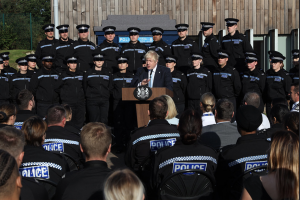Johnson, the Military, and the No-Deal
Luigi Lonardo (King’s College London)
History books are set to write the name of the UK’s prime minister, Boris Johnson, as that of the man who will deliver Brexit despite the two conflicting motivations that he himself represented for his country. In his ‘acceptance speech’ as leader of the conservative party, Johnson described the UK as being animated by a desire to be close with the EU and a desire to be outside the EU. The two motivations would not be mutually exclusive, had the EU not made it clear that they are.
We went close to a no-deal in March: the end of the world was near, but the deadline was pushed back a few months. The world did not end this time round, but the same scenario is extremely likely to represent itself in late October. Johnson’s election has increased the chances of the UK leaving without agreement, since the new prime minister has expressly run a campaign on taking out the UK out of the EU by 31st October – without or without a deal.
What are the internal security and defence implications of a no-deal? What will happen if there is no transition period and if EU law is suddenly switched off in the UK? This blog has already discussed here the implications of a no deal for aspects of internal security, so this post will only concentrate on the military.
It is unlikely that the first thought of Johnson will be devoted to security and defence. It is equally likely, however, that the military may be raised by the Johnson administration to a key issue. There are two reasons why it may be so. First, because the issues are close to the more conservative fringes of the conservative party. Second, because the issues proved to be relatively uncontroversial in the negotiations with the EU. Focus on security and defence, in other words, would allow Johnson to play safe. For example, he has promised to raise the defence budget (and so had done his rival, Hunt) and to end the ‘unfair’ prosecution of British soldier who fought in Northern Ireland. He visited a naval base in his first visit to Scotland, during which he announced the creation of a new Office for Veterans’ Affairs.
The no-deal scenario
In a rare mismatch between words and actions, the May government, who kept reassuring people that a no-deal would not be, excuse the pun, a big deal, has set up a defence contingency plan designed to guide military aid to civil authorities in the event of a generalised emergency arising during the post-Brexit period. The Minister of Defence, Mark Lancaster, even set the ground to call reservists into permanent service in support of the contingency plan (see also this story about MPs being warned not to walk home alone because ‘there might be consequences’). Johnson has to manage the legacy of a country that is, almost literally, ready for war.
Apart from the potential generalised panic and shortage of supply which the government seems prepared to manage through the military, however, there should be no reason to worry (similar concerns are expressed by the Financial Times). Except for the nuclear expertise on which the UK currently relies, and which risks to be lost on 31st October (preparations are in place to manage the civilan implications); the information that UK police would not be able to access (Europol, Eurojust and related databases); and the instruments UK’s judicial authorities could not avail themselves of, such as the European Arrest Warrant for the automatic surrender, by other EU Member States, of persons subject to criminal prosecution in the UK.
The UK military’s end of commitment to EU operations, instead will not come abruptly. The UK has already started to disengage from the operations conducted within the Common Foreign and Security Policy – a policy of which it was never a fervent supporter anyways. It has relinquished the command of operation EUNAVFOR, for example (the naval operation for fight of piracy off the Somali coast). As François Heisbourg of the International Institute for Strategic Studies commented, ‘there is no European omelette here to unscramble in case of a Brexit.’
It is not excluded that some members of the conservative party will put pressure on Downing Street for a reform of the military in general – including military service – and of the navy in particular (an object already cherished by Hunt during the electoral campaign).
The views expressed in this article reflect the position of the author and not necessarily the one of the Brexit Institute Blog
Luigi Lonardo is a lecturer in EU Law at King’s College London and visiting lecturer at the Paris School of International Affairs, Sciences Po.
(Photo: PM Boris Johnson visits Police. Featured image credit: Number 10 via a BY-NC-ND licence)



